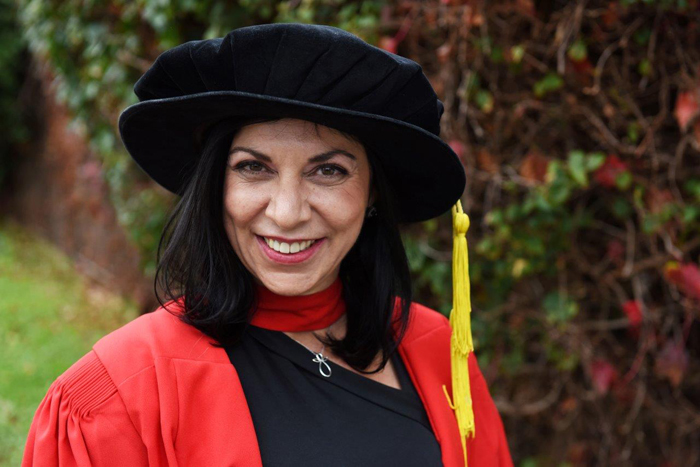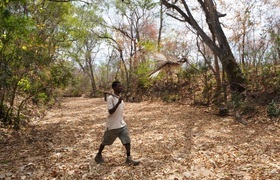It never gets easier. You just get better.'
14 June 2016 | Story Judith Browne. Photo Michael Hammond.
Completing a PhD is a bit like running a marathon – and Janine Joubert would know. Her PhD took eight years, 778 references and 637 pages to complete. This long-distance runner and CrossFit enthusiast speaks about what has helped her go the (academic) distance.
“Both long-distance running and CrossFit require competencies, discipline and a strong mental fortitude. This is exactly what is needed to complete a long-distance, mentally and physically gruelling thesis. As they say in CrossFit, 'It never gets easier. You just get better.' ”
One of 99 PhDs graduating this June, Janine was working at one of the continent's largest mobile telecommunications companies when she decided to study one of industry's big buzzwords – innovation.
“[Any] company culture needs to constantly drive innovation – especially technology innovation – to increase value and drive down cost,” Janine explains. But developing and introducing a new product or service also comes with risks.
“My research [in information systems] provides best practices to increase competencies when launching innovations and also consider the risks that could have an impact on the innovation. Very simply, it is like giving you four different recipe options for baking a cake, stating suggestions for all the ingredients you need as well as indications of the right proportions you require.”
A major component of Janine's PhD is a framework for guiding new product and service development –one that is both academically grounded and empirically validated. To make her research more accessible, she's also created a visual interface and dashboard that consolidates her findings and can support decision making at each major development phase.
Research in action
What sets Janine's research apart in many ways is her methodology. She tackled the question of innovation with action research.
“Performing action research sounded deceptively easy, which initially attracted me to it. However, I soon discovered that action research is significantly more difficult and demanding than other type of studies.”
As a methodology, action research is distinct in that you don't just research your problem from a distance – you're actively involved in solving it, Janine explains. It's also progressive and collaborative: as you introduce various solutions, you keep analysing the problem and adapting your approach – in collaboration with the teams working in your field. You're also reflecting on your research and improving on it as you go.
“Action research by its very name implies action … It's sometimes uncomfortable, challenging and work-intensive, but ultimately rewarding.”
The additional work Janine put in ultimately paid off. Top scholars in her field have since reviewed the research and responded with high praise.
“Action research is notoriously difficult in a PhD study both because it is lengthy and because the action researcher must also possess problem-solving competencies far beyond a research competence,” wrote Professor Peter Axel Nielsen of Aalborg University in Denmark. “This thesis brings research and practice together in a convincing manner and that is a rare quality in an action research PhD study.”
Going the distance
No long-distance race is done alone. There are supporters along the way, people providing nourishment and encouragement. So too with a PhD.
“It's true what they say – it's not what we have in life but who we have in our lives that matters,” Janine reflects. “I was lucky in that JP [Janine's supervisor Professor Jean-Paul van Belle in the Department of Information Systems] always believed in me. Even when I sometimes failed to do so myself. It was really hard to do this research and sometimes I just felt exhausted from the sheer volume of what I was attempting to achieve. A quiet, 'You got this' from JP kept me going.”
Janine's parents continue to be a source of inspiration: “My mom was one of nine kids that did not have the financial support to study further, so I am glad that I could honour her as someone that certainly had the ability but not the means to study. My dad is my hero. I witness his struggle with Parkinson's disease every day and he never ever complains. How could I quit if he never does?”
And then there's Janine's “close but fierce circle of friends who aggressively support and believe in each other” – who were of particular support during the days leading up to the handing in of her thesis.
What advice does Janine have for fellow students facing their own long-distance journey?
“In the end it all boils down to one simple thing: How badly do you want to achieve your goal? Life is going to throw obstacles in your way ... I had a quote up against my study wall that states: 'Success in life comes when you simply refuse to give up, with goals so strong that obstacles, failure and loss only act as motivation.' I have always been stubborn like that.”
 This work is licensed under a Creative Commons Attribution-NoDerivatives 4.0 International License.
This work is licensed under a Creative Commons Attribution-NoDerivatives 4.0 International License.
Please view the republishing articles page for more information.










